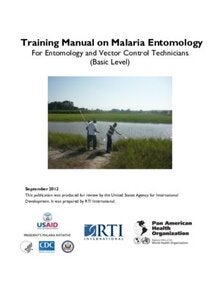Malaria remains a major cause of death and sickness in most tropical regions of the world, where it is endemic in 106 countries. In 2010, about 81% of the total 216 million malaria cases took place in Africa, and 13% of cases occurred in Southeast Asia1 . The largest proportion (91%) of the estimated 665,000 annual deaths from malaria occurs in Africa, mainly affecting children under five years old (86%). In the region of the Americas, over 670,000 confirmed malaria cases occurred in 2010, with 133 malaria-attributed deaths. Transmission is active in 21 countries putting about 20% of the population of the Americas at risk. Malaria imposes severe constraints on economic development and is an important cause of poverty in most disease endemic countries.
Purpose of the manual A two-tier training course for entomology technicians has been developed aimed at facilitating the strengthening of core competencies for entomological monitoring and surveillance in disease endemic countries.
This manual is aimed at guiding a basic level (Tier-1) entomology course, covering:
1. The life-cycle and bionomics of mosquitoes
2. Adult and larval sampling, mosquito identification and incrimination of malaria vectors
3. Primary malaria transmission indices and what they represent
4. Malaria vector control and current primary interventions
5. The role of entomology in vector control
6. Basic principles for laboratory rearing of mosquitoes
7. Tests of mosquito susceptibility and residual efficacy of insecticides used in vector control.
This manual presents the basic issues that are critical to understanding the primary educational goal of each subject area. It is however anticipated that the training course will provide extended opportunities for field work to assure a fuller learning experience and consolidate practical skills/competencies. Adult learning and participatory format is anticipated, in which students should be encouraged to find out things for themselves and from each other. A sample of the curriculum and schedule for the basic entomology technician course can be found in Annex I.
|

